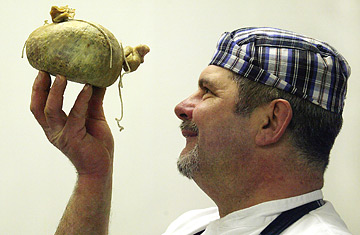
Scottish master butcher Neil Watt inspects one of his haggises prior to its going on sale in his butcher's shop in Montrose Scotland. Haggis production is in full swing in preparation for Burn's night.
The skirl o' the bagpipes, even more dramatic by virtue of being played indoors, accompanies the "great chieftain o' the puddin-race" born aloft to the table by a chef. Then, a wild-eyed Scotsman recites Robert Burns' poem Address To a Haggis, and upon reaching the line, "An' cut ye up wi' ready sleight," he plunges a dagger into the taut sheep's stomach amid cheers from the diners. In a ritual repeated by Scots across the globe on Burns Night, January 25, the birthday in 1759 of their most cherished poet, the attack on the main course continues:
"Trenching your gushing entrails bright,
Like onie ditch;
And then, O what a glorious sight,
Warm-reekin, rich!
Further slashing releases a gray speckled mixture of lungs, heart, liver and oatmeal, prompting more cheering and more whisky before everyone tucks into the contents of the haggis, along with tatties and neeps (potatoes and turnips).
Eddie Tait might be called a professional Scotsman, and at this time of year, the 34-year-old founder of the networking group Scots In London eats a lot of haggis. "It's no good for the waistline," Tait complains weakly as he savors another forkful of his country's national dish. The traditional Burns Supper has changed little in over 200 years. Its essential elements are poetry, song, whisky, dancing, bagpipes, the recounting of raffish tales from the poet's short life, the odd misty-eye and, of course, haggis. "It's not just a night anymore, or even a week, it's a whole bloody month!" Tait complains, again unconvincingly, as he raises his glass for yet another toast. The former Morgan Stanley banker has taken well to his new line of work — last year Tait attended 11 Burns Suppers stretching into February. It's early January when TIME donned the de rigueur kilt to join him as a Burns Supper guest at London's illustrious private Caledonian Club. "A little island of Scotland in Belgravia," as past chairman Alex Wilson puts it.
But celebrating Scotland's Bard is not just the preserve of organized societies, expats, or golf clubs. Elsewhere in London, pubs are throwing haggis buffets, Ceilidh dances are sold out, and traditional formal suppers are spreading over the calendar. As singer and TV presenter Fiona Kennedy points out in her after-haggis speech at the Caledonian Club, back in her hometown of Aberdeen, Burns Night now stretches over so many days that it's referred to as Ramadram.
The popularity of Burns celebrations reflects the enduring affection for the man and his work. "After all, we don't have Wordsworth wakes, Tennyson teas or Shakespeare suppers do we?" asks Wilson. It may be less than a month since the world joined hands to bring in the New Year with Burns' song "Auld Lang Syne," but this is the night when Scots celebrate the full canon, performing to each other the spooky tale of "Tam O'Shanter," or evoking the patriotic sentiment of "Scots Wha Hae" or the tender beauty of "A Red, Red Rose." "All parts of Scottish society could identify with him," says Wilson, who is also a past president of the Burns Club of London. "He would have been quoted everywhere by the common people. He wrote [poetry] in their language, while he wrote his letters in perfect English."
Burns Night is also an occasion for Scots at home and abroad, from Ewan McGregor to Gordon Brown, to affirm their identity as part of a fiercely proud people. Scotland's official national day is actually St. Andrew's day, November 30, but it's not a holiday and passes barely noted. Scots would rather celebrate their heroes, it seems, than themselves, and Burns Night is just such an excuse for patriotic revelry refracted through the egalitarian everyman poet who so captured the national psyche.
Robert Burns was born into a grueling existence, laboring as a peasant farmer in Ayrshire in southwest Scotland, yet he still managed to study and became fluent in Latin and French. Still, he is most treasured as the champion of the common man, having written passionately on social injustice, his country, nature, food, drink and, not least, women.
Burns was often outspoken and radical, as works such as "A Man's A Man For A' That" (A Man's a Man For All That) show:
"Gie fools their silks, and knaves their wine —
A man's a man for a' that.
For a' that, an a' that.
Their tinsel show, an a' that, The honest man, tho e'er sae poor, Is king o men for a' that."
Still, the feted Edinburgh society of the time couldn't get enough. Novelist Henry Mackenzie called him "the heaven-taught ploughman". And how the ladies fell for the rough romantic with the wicked turn of phrase. "There is no doubt about it, he was a ladies man," says Wilson. "He was gifted in every respect." Burns fathered at least a dozen legitimate and illegitimate children in his 37 years.
A bronze bust of Burns in the midst of gilt-framed romantic Highland scenes presides over the Caledonian Club dining room. Tom Quinn is singing "Rantin', Rovin' Robin" accompanied by Clive Gavin on piano as the members and guests digest. When wearing trousers, by day, both men are senior managers for the Royal Bank of Scotland.
As for Caledonian Club elder statesman and Burns authority Wilson, he sups at home on Burns Night. "My wife was born on the 25th of January and she doesn't like haggis," he says.
